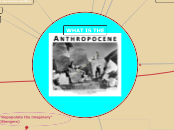par Valou v Il y a 11 années
645
Intuitive definition

par Valou v Il y a 11 années
645

Plus de détails
1. (Government, Politics & Diplomacy) a theory or system of society according to which government is controlled by scientists, engineers, and other experts
"A planet under pressure" : Planetary stewardship
In a Stanford University alarmist policy paper entitled “Navigating the Anthropocene: Improving Earth System Governance”, a set of institutions will have to be formed to enforce transition. The paper explains: “Human societies must now change course and steer away from critical tipping points in the Earth system that might lead to rapid and irreversible change. This requires fundamental reorientation and restructuring of national and international institutions toward more effective Earth system governance and planetary stewardship.”
Although the creation of a technate (a society operating under technocracy) is an eventual goal of the technocracy movement, intermediary steps may be taken to achieve that goal. Construction of one or more technocratic eco-units (TEU) is one of those possible intermediary steps.
By contrast, a Contemporary dating suggests a relatively new and unusual condition. It implies thresholds rapidly being crossed, and it feeds into contemporary perceptions of precaution, risk and ‘manufactured uncertainty’ (Beck 2009), as well as into observa-tions about the accelerating pace of globalisation and change. It sits easily with the idea that we are in an exceptional time, needing exceptional, emergency responses.
Key figures in the "greening" of world-systems analysis include Andrew K. Jorgenson, Jason W. Moore, Stephen Bunker, and Richard York.
Thus, Bunker elucidates the cross-scale linkages that, over the past four centuries, have tied the Amazon basin into the world-system and its technological development, changed its ecology, and also allowed its ecology to influence distant regions.
Bunker (2003) examines the social-ecological history of a specific region in the most detail, analyzing 400 yr of raw material extraction from the Amazon and demonstrating the interactions of regional topography, climate, and ecology with advances in transport technology and the increasing and changing demands of core economies. Each extractive episode involved the transport of greater volumes of goods, from spices to turtle oil to fine woods to rubber to iron ore, more cheaply over greater distances. Some of these products became obsolete, leading to regional economic downturns, e.g., turtle oil when mineral oils came into greater use, and rubber when the rubber tree was domesticated and grown in plantations in southeast Asia. In the Amazon, rubber trees cannot grow close to each other because of an endemic fungus, an important driver of domestication efforts, and hence the replacement of distant native forests by rubber plantations
Ecocide is defined as “the extensive damage to, destruction of or loss of ecosystem(s) of a given territory, whether by human agency or by other causes, to such an extent that peaceful enjoyment by the inhabitants of that territory has been or will be severely diminished.”
Defined in the proposed Ecocide Act, all nations, corporations and individuals would be “under the principle of superior responsibility” and legal obligation to “ensure their actions do not give rise to the risk of and/or actual extensive damage to/or destruction of or loss of ecosystem(s).”
End Ecocide in Europe is a European Citizens Initiative who have proposed a law to the European Union to make ecocide a crime
Prenons comme deuxième exemple la pétrolisation du monde au XXe siècle : elle est encore le résultat de choix politiques opérés pour maintenir et stabiliser le capitalisme. Tout au long du XXe siècle, le pétrole est plus cher que le charbon, qui passe pourtant de 5 % de l’énergie mondiale en 1910, à plus de 60 % en 1970. Cette pétrolisation est tout d’abord le fait de la suburbanisation et de la motorisation
Wallerstein characterizes the world system as a set of mechanisms which redistributes surplus value from the periphery to the core. In his terminology, the core is the developed, industrialized part of the world, and the periphery is the "underdeveloped", typically raw materials-exporting, poor part of the world; the market being the means by which the core exploits the periphery.
World-system refers to the inter-regional and transnational division of labor, which divides the world into core countries, semi-periphery countries, and the periphery countries
Core countries focus on higher skill, capital-intensive production, and the rest of the world focuses on low-skill, labor-intensive production and extraction of raw materials.[3] This constantly reinforces the dominance of the core countries
Dependency and world system theory propose that the poverty and backwardness of poor countries are caused by their peripheral position in the international division of labor.
During the Industrial Revolution, for example, English capitalists exploited slaves (unfree workers) in the cotton zones of the American South, a peripheral region within a semiperipheral state (the United States)
Intellectual underpinnings and ethical framework of science :
They are defined as presuppositions as it is “presupposed” that they are true and we take them as guidelines defining our actions in the different contexts in which we perform.
in that it provides the ideational underpinning for a particular view of the world, which it, in turn, helps legitimate.
// Biological diversity --> Biodiversity (sustain)
Major research findings: • The Earth is a system that life itself helps to control.
Ethics of global stewardship and strategies for Earth System management are urgently needed.
The human enterprise drives multiple, interacting effects that cascade through the Earth System in complex ways
Global change is much more than climate change. It is real, it is happening now and it is accelerating.
Earth system governance builds on earlier notions of environmental policy and nature conservation, but puts these into the broader context of human-induced transformations of the entire earth system.
How have we reached this point?